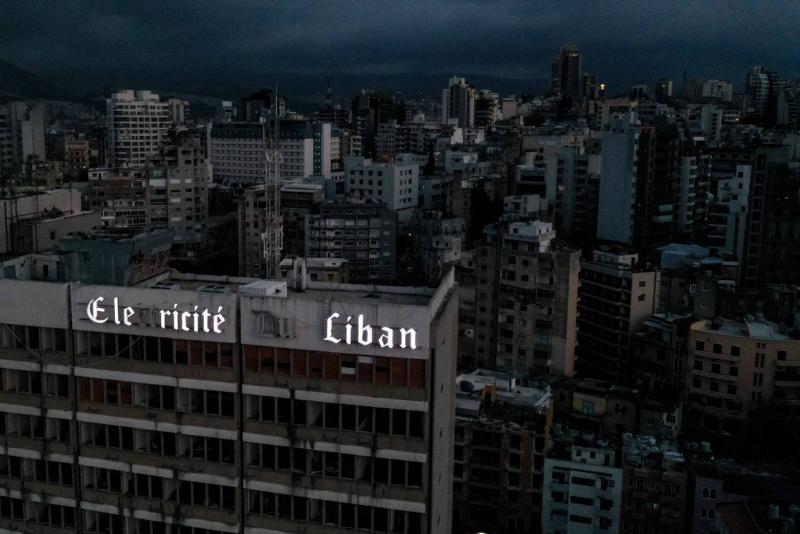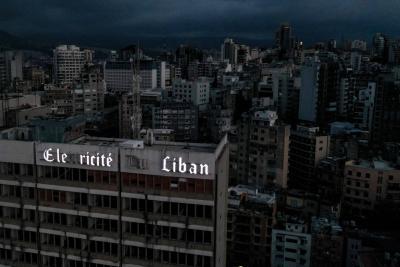The complete shutdown of the electricity supply across Lebanon at the end of the weekend, following the total shutdown of the last remaining production unit on the electricity grid, has reignited discussions on solutions and proposals to revive the electricity sector, which has been mired in corruption, mismanagement, and political rivalries for over 30 years. In recent years, this sector has primarily relied on piecemeal and "makeshift" solutions, costing the Lebanese state nearly half of the public debt, which stands at around $102 billion, without leading to the construction of any new plants or the adoption of modern technologies to put it on the path to revival.
Many agree that the solution to Lebanon's electricity crisis lies in involving the private sector and enhancing reliance on solar energy. Samir Geagea, the head of the Lebanese Forces Party, stated in a statement on Monday that "the electricity crisis the country has faced in the past few days is not the first of its kind, and it clearly demonstrates that the management of the electricity sector has been completely unsuccessful for the past 15 years, with no indication that this management will change." He added that "there remains only one solution, which is to immediately involve the private sector in the process of generating and distributing electricity in Lebanon."
Geagea urged the Chairman of the Parliamentary Committee for Public Works, MP Saji Atyeh, to expedite the discussion of one or more proposed laws for private sector involvement and to send them to the joint committees as quickly as possible. Subsequently, he requested President Nabih Berri to convene a legislative session under the utmost necessity, as getting the Lebanese citizen out of darkness is the utmost necessity that requires a clear and explicit law in the parliamentary council to involve the private sector in electricity generation and distribution in Lebanon.
MP Atyeh welcomed Geagea's request, confirming that he agrees on the need to expedite the approval of the law for private sector involvement, which he deemed extremely essential, as many companies have offered to work in this sector. He noted that meetings of the parliamentary committees should resume at the beginning of September.
Atyeh spoke to "Asharq Al-Awsat" about the "fundamental problem in the electricity sector being the absence of proper management" because the state lacks the authority to enforce necessary billing effectively, stating that the collected revenue is weak and that the presence of Syrian and Palestinian influences significantly impacts this area. He highlighted two additional issues: the technical, administrative, and financial waste, which amounts to around 40%, in addition to operational costs that are twice as high in the plants.
Atyeh argued that the solution lies in resorting to "gasification because of its low cost, along with solar energy and partnerships with the private sector," emphasizing that work is underway to pass the relevant laws. He affirmed that the electricity file "is the most important file in the Lebanese state because it is a model of the behavior of all public facilities in the country."
The Lebanese caretaker Minister of Economy, Amin Salam, had accused politicians, fuel companies, and electricity suppliers of blocking a Qatari offer to build three renewable energy plants to mitigate the ongoing electricity crisis in Lebanon for decades. Meanwhile, researcher and economist Dr. Mahmoud Jba'i considers that "the main problem we face in the electricity file is political bickering, and that the way of addressing it is far from practical, scientific, and logical solutions to solve the crisis. Moreover, there is a political faction that monopolizes the sector and manages it incorrectly and haphazardly." Jba'i pointed out in a statement to "Asharq Al-Awsat" that "we have spent more than $45 billion on electricity, including about $26 billion over the last 14 years, according to forensic audits, while in return, there has been little productivity, and no factories or plants have been built, knowing that this amount would have sufficed to light up all of Lebanon."
Jba'i stresses that "what is being said about the problem being the lack of funding from the Central Bank is not true," clarifying that "the Central Bank allows the Ministry of Energy, like all ministries, to use its funds as mentioned in the budget, noting that the Electricité du Liban collects high bills in US dollars, while funding the sector from the Central Bank's reserves and depositors' money is completely rejected."
Jba'i believes that "reviving the sector begins with establishing a regulatory authority to allow privatization and the entry of private sector companies," indicating that "the foundation is to separate politics from economics in this file and all other economic files." The World Bank has set three conditions for financing the electricity sector in Lebanon: the financial auditing of Electricité du Liban, the establishment of a regulatory authority for the electricity sector, and ensuring cost recovery.




